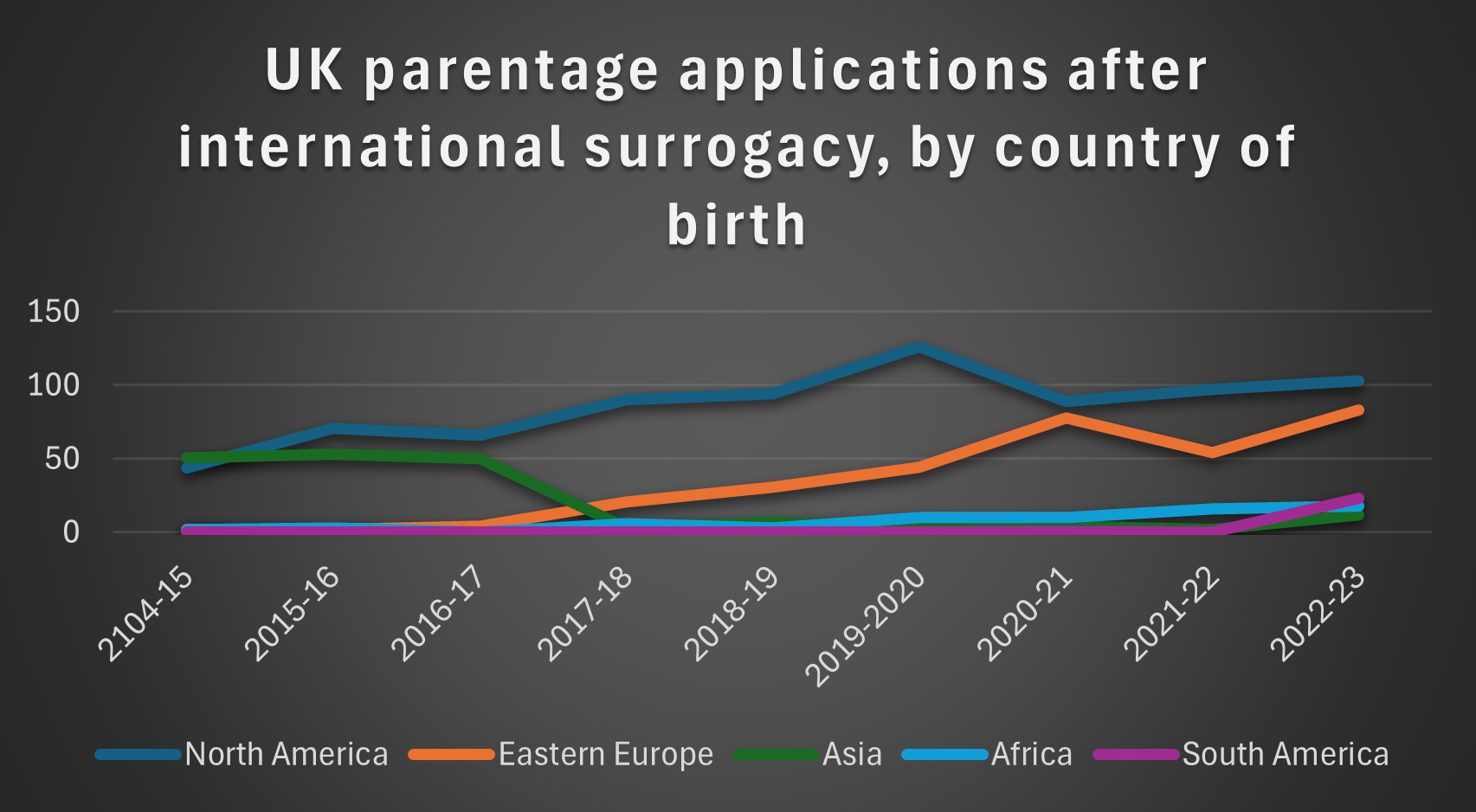We often get asked how many UK parents go overseas for surrogacy and where they are going. Hard data on the scale of international surrogacy is difficult to find but we can get close with information from the English family court that records the numbers of parental order applications made by UK parents (the process by which they become the legal parents of a child born through surrogacy) and is broken down by country of birth.
The data is not necessarily complete (some parents are not eligible to apply for parental orders – such as non-biological parents – and some may not apply through choice or lack of awareness) but it does give us a broad overview of where surrogacy is taking place, and how that is growing and changing over time.
What do the latest statistics on international surrogacy show?
CAFCASS (the Child and Family Court Advisory and Support Service) has recently released new data up to 2023. It shows that, since 2014, UK surrogacy arrangements accounted for 47% of all parental order applications made to the family court. That means that over the past ten years, more than half of UK parents through surrogacy have gone abroad to find a surrogate.
And by a very long distance, the US has been the most popular international surrogacy destination, accounting for 27% of all parental order applications, and 56% of international surrogacy cases.
That is good news for ethical surrogacy, since in both in the UK and the US (which therefore make up 74% of all surrogacy cases), surrogacy is safe, legal and well-established.
What about surrogacy destinations other than the UK and the USA?
It is also interesting to see the scope of applications relating to births elsewhere over the past 10 years. There is clear evidence – as we see on the ground – of surrogacy having moved from place to place as the landscape has changed.
Births in Asia make up less than 6% of overall applications since 2014 (with the overwhelming majority of these relating to applications made before 2017 for children born in India and Thailand, which is not surprising given that commercial surrogacy was prohibited for foreign couples in both countries in 2015). Since 2017 very few parental order applications have been made following births in Asia.
Applications in respect of surrogacy in Ukraine rose from 2017 onwards, making Ukraine historically the third most popular single surrogacy destination after the UK and the US, accounting for 8% of all parental order applications since 2014. Unsurprisingly the latest figures show a dramatic fall in applications since 2023, the obvious result of Ukraine having been a warzone since February 2022.
In the last few years, parental order applications for children born in Africa and South America have started increasing, but in reality they remain small – less than 20 cases in Africa a year (with the majority in Nigeria) and making up only 2.5% of parental order applications overall.
South American countries like Mexico and Colombia are being promoted as current surrogacy destinations but the numbers show how new this is. No parental order applications were recorded for South America before 2020 and all but one of the applications relating to births in South America were made after 2022. These are therefore very clearly new destinations. The numbers also remain very small, with only 7 Mexican surrogacy cases in total since 2014. We routinely advise parents to take care with emerging destinations and for South America it is clear that there is no established track record.
In Europe, where most countries prohibit surrogacy (or have no framework supporting it), the numbers of surrogacy births are also tiny, with just 7 cases since 2019 in Cyprus (where surrogacy is unregulated), and 11 in Greece (where there is a somewhat restrictive legal framework).
What do intended parents considering international surrogacy need to know?
What all this shows is that parents considering their surrogacy options need to take enormous care and to sift reality from what they are told about how safe, ethical and well-established surrogacy is in the country they are considering going to.
It also shows clearly that the overwhelming majority of UK parents conceiving through surrogacy either do so in the UK or in the USA. Opponents of surrogacy often focus on examples of unregulated surrogacy taking place in poor countries, and while we should of course do everything we can to eliminate any unethical surrogacy practice, the CAFCASS statistics show very clearly that this context is the exception rather than the norm.
We are incredibly proud at NGA Law to be the leading specialists in surrogacy law. The fact that we have – for 15 years – been immersed in what is happening on the ground gives us a unique perspective to be able to advise parents and keep them safe. We have advised parents engaging in surrogacy in every one of the destinations mentioned in this blog (and many more). We are also proud to have represented parents in more than a quarter of all the US (and 17% of all the international) surrogacy cases ever heard, going right back to the very first international surrogacy case in 2008.
Leading experts in surrogacy law
Find out more about how we support those creating families



